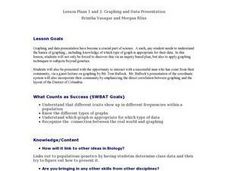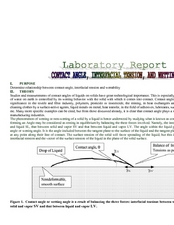Curated OER
Target Earth
Space scientists use water displacement to determine the mass of a cubic centimeter mini meteorite, and then use it as a small-scale representative of an asteroid. They figure out the orbital velocity of an asteroid. Then they use a...
TerraCycle
What Can Nature Teach Us about Sustainable Design?
Talk about Velcro®, Gecko Tape, WhalePower turbine blades, and other innovations that mimic nature to inspire your STEM or engineering class. This set of worksheets gets them thinking about imitating nature in terms of sustainable...
Curated OER
Graphing And Data Presentation
Students engage in a study of science and mathematics with the practice of creating graphs. A guest speaker comes to the class to share statistics from the community and the students are shown how he uses the coordinate system in the...
Curated OER
Simple Machines
Students investigate simple machines. In this simple machines lesson, students explore how tools increase productivity and make life easier. Students experiment with simple tools and discover the parts of each tool.
Curated OER
Tessellations
Students identify and construct figures that tessellate. They investigate which regular polygons tessellate and how to modify them to make other tessellating figures. Students explore how naturally occurring tessellations have been...
American Museum of Natural History
Thinking in the Three Dimensions
Discover different dimensions with paper folding. Pupils first read about zero, one, two, and three dimensions, and then learn about the fourth dimension, time. They then use origami to create models of shapes in three dimensions and use...
NASA
Keeping Nine Eyes on the Weather
Take a look at climate change from another angle. Readers learn about the MISR instrument on the Terra satellite and how it studies Earth. Pupils experience how the multiple cameras give scientists multiple views so they can better study...
Curated OER
Contact Angle. Interfacial Tension and Wetting
Students determine the contact angle of water on different surfaces. In this physics lesson, students calculate their percent error using a mathematical formula. They explain the advantages of using non-wetting surface for certain...
Curated OER
Exploring Earth Through Maps and Technology
In this maps worksheet, students read 3 pages of detailed information about maps, latitude, longitude, topography, satellites and global positioning. Students then answer 10 questions. There is also a research project assignment available.








